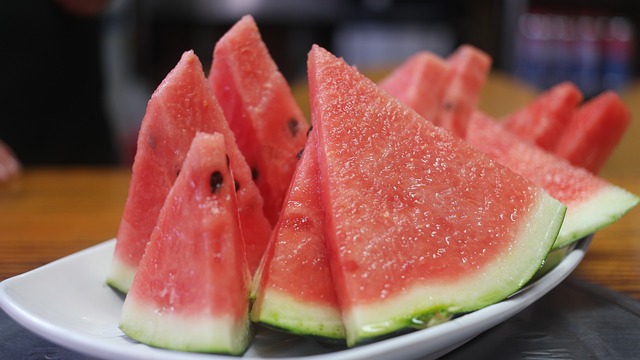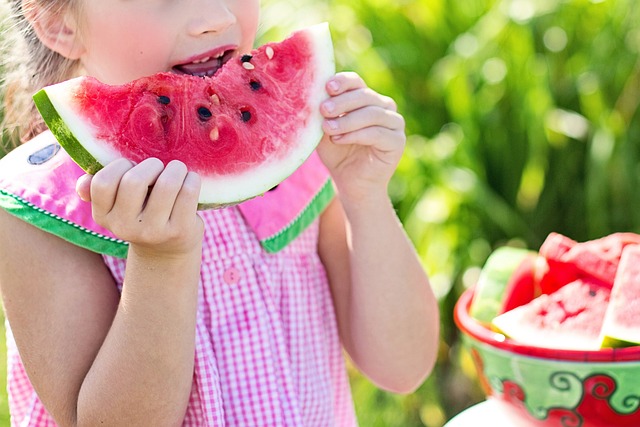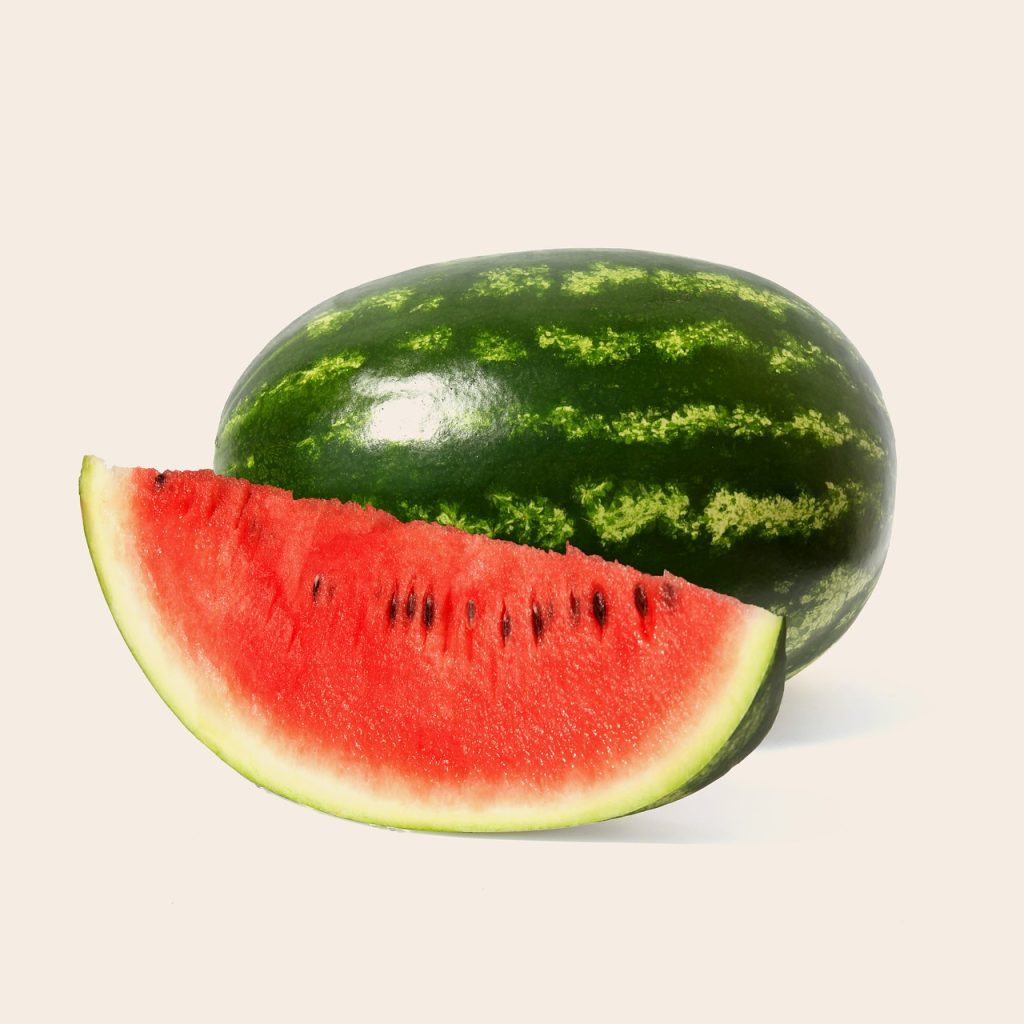Watermelon
Watermelon is a tasty summer treat that is also good for you. Everyone loves watermelon in the summer, but it’s more than just a delicious and cooling fruit. This bright red gem contains nutrients and beneficial chemicals that can make a big difference in living a healthy life. This article will go into great depth about the many health benefits of watermelon, including how much to eat and any possible side effects to consider.
Table of Contents
Hydration Hero
Our health needs to stay hydrated; watermelon is a great way to do that. Because it is mostly water, It is one of the best foods for staying hydrated. This is true during the hot summer. Not only is staying hydrated essential for maintaining energy and brain power, but it’s also vital for keeping your face glowing and your body working at its best.
Heart Health
Lycopene: The Heart’s Best Friend
The potent antioxidant lycopene is one of the best things about watermelon. It gives the fruit its red color. Researchers have conducted extensive research on lycopene to explore its potential for reducing the risk of heart disease. Lycopene protects cells from damage and lowers inflammation, a major cause of heart disease. It achieves this by eliminating free radicals.
Citrulline: Improving Blood Flow
Watermelon contains citrulline, an amino acid that may aid blood flow and metabolism. The body changes citrulline into arginine, making nitric oxide, which helps blood vessels relax and move better. People who want to keep their hearts healthy and lower their risk of high blood pressure may benefit the most from this process.


Exercise Performance
For busy people, watermelon can make a big difference. It contains citrulline, which is beneficial for your heart and can enhance your sports performance. Studies have shown that taking citrulline supplements can alleviate muscle pain and accelerate healing, facilitating adherence to a regular workout schedule. Drinking this juice before you work out might give you the extra boost you need to do your best.
Skin Health
Watermelon is suitable for your face because it has a lot of vitamins A, C, and B6.
Vitamin C: Collagen Production
Collagen is a protein that keeps your skin tight and flexible. You need vitamin C to make collagen. Eating watermelon regularly can help keep your skin looking young and healthy because it helps with collagen production.
Vitamin A: Skin Cell Repair
Many skin cells need vitamin A to stay healthy and repair themselves. Because it helps the body get rid of dead skin cells and grow new ones, vitamin A makes the skin healthier and brighter.
Consumption Advice
There are numerous ways to consume watermelon fruit. However, eating the right amount is essential for the best results.
Recommended Serving Size
Healthy Adults:
A healthy adult should drink about one to two cups (152 to 304 grams) of coffee daily. This serving gives you a good mix of nutrients and water without making you too sugary.
Children:
Change the serving size for kids based on age and how many calories they need. A young child may only need a half-cup to a cup of watermelon, while older kids can eat more like adults.


People with Diabetes:
People with diabetes should be careful about how much watermelon they eat because it naturally has a lot of sugar. It’s best to include it in their meal plan and talk to a healthcare worker about the right amount of food to eat.
Best Practices
Fresh is Best:
Choose fresh fruit that has the most minerals and tastes the best when you can.
Ripeness Matters:
For the best taste and nutrition, pick a ripe watermelon. A ripe one will have a yellow spot on the bottom and may bounce slightly when you press it.
Versatility is Key:
Eat fruit in different ways! You can cook it or cut it into cubes to eat as a snack for a different taste.
Seed Situation:
Watermelon seeds are safe to eat and contain some nutrients. If you’d rather not deal with seeds, choose a seedless variety.
Potential Side Effects and Precautions
Most people can eat watermelon without any problems, but there are a few things you should know about possible side effects and precautions:
Allergy
People can sometimes be allergic to watermelon. Some signs could be rashes, swelling, itching, or trouble breathing. If any of these happen to you after eating watermelon, you should immediately see a doctor.
Digestive Discomfort
Too much watermelon can cause bloating, gas, or diarrhea because it is high in water and fiber. This is especially true for people with sensitive digestive systems. To avoid pain, moderation is key.
Blood Sugar Impact
Healthy people don’t need to worry about watermelon’s natural sugars, but people with diabetes should. The sugar can cause blood sugar levels to rise, so it’s best to talk to a healthcare worker about the right portion sizes.
Medication Interactions
Some medicines, especially blood pressure and diuretic drugs, can combine potassium. Watermelon has a moderate amount of potassium. Before eating a lot of watermelon, ask your doctor if you are taking any medications.
Hygiene and Storage
Hygiene:
Always wash the rind of a watermelon before cutting it to remove any potential germs.
Storing:
Store the cut fruit in the refrigerator to prevent watermelon from spoiling. Throw away any watermelon that has mold on it.
In conclusion
Watermelon isn’t just a cool summer treat; it’s also a great source of nutrients that can significantly help your health. This fruit is a flexible and tasty addition to any diet. It can help your heart stay healthy, make you more fit, and even make your skin look younger. You can fully enjoy watermelon’s health-promoting and cooling benefits as long as you eat the right amount and follow best practices.
This summer, grab a slice and let this water hero help you stay healthy and relaxed!
frequently asked Questions
Q1. Is watermelon a healthy food that can help me lose weight?
A: Watermelon can help you lose weight, that’s for sure. It’s a light but whole snack because it’s mostly water and not very high in calories. It also has a lot of vitamins and enzymes, which are suitable for your health in general. As part of a healthy diet, eating watermelon within limits is essential.
Q2: Can pregnant women eat watermelon without getting sick?
A: Of course! You can eat watermelon while pregnant, which might even be good for you. High water levels can help you stay hydrated; the vitamins and minerals suit your and your baby’s health. But because watermelon naturally has a lot of sugar, it’s best to eat it in balance.
Q3: Can watermelon help with hydration?
A: Yes, fruit is an exceptional way to stay hydrated. Because it’s essentially water, it facilitates fluid stability for your frame. Watermelon is an excellent way to stay hydrated, which is particularly beneficial when it is hot outside or after working out.
Q4: What’s the first-class way to store more watermelon?
A: If you have more watermelon, place the smaller pieces in a container that does not allow air and place it inside the fridge. This will keep the watermelon fresh and prevent it from getting worse. Also, wash the watermelon’s rind before slicing it to remove any germs. You can store most watermelon in the fridge for three to five days.


Amjad Mustafa, the owner and author of Keen2Know, is a highly qualified individual with strong experience in technical engineering. He is an experienced professional with a variety of business, technology, and car knowledge. His academic background prepared him for a diverse career and established him as a prominent figure at the intersection of these rapidly evolving industries.



